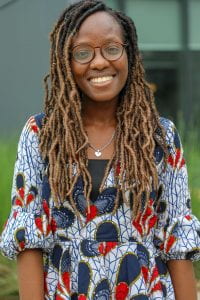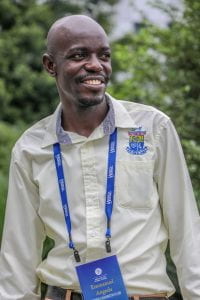
1.2.3, Here come the Blue Hens!!!
We were honored as 25 young African leaders to begin our journey at the University of Delaware, as part of the Mandela Washington Fellowship 2019 cohort. The fellowship, the flagship program of the Young African Leaders Initiative (YALI), was started in 2014 by former United States President, Barack Obama to promote exchange and learning between the United States and Africa. It includes a six-week learning program in a U.S educational institution and a three-day summit in Washington, D.C.
For our Delaware cohort, yet another opportunity afforded by the Program was a meeting with the Governor of the State, John Carney, the members of the Senate, and those of the House of Representatives. During the debriefing for this week, we were elated about the forthcoming meeting with these dignitaries, but were also aware that these meetings would require certain skills from us, one of which is networking.
Working on…Networking
The Fellowship Program organized a timely session for us on Monday, 25th June 2019, with Dr. Rachel Coppola who took us through the essential ‘must-knows’ about networking. From that session, many of us learned that the focus is not necessarily on what will be benefited from the connection…but on the connection itself.
We learned that networking is not an event, it is a life-long practice. We learned to be present in every networking opportunity, and to listen more than we speak. Dr. Rachel Coppola, in her excellent delivery, also gave us tips (which we suspect will forever be golden) on how to be authentic as we exchange. We all practiced our elevator pitches and got over any cold feet. Some of us made blunders, but we got constructive feedback. If only we knew how important that session would be to our Tuesday visit to the State House!
At the State House, we were all so excellently professional in our conversation and networking, if we may say so ourselves! But even more than our professionalism, was the experience and inspiration that came with the visit.
Diving into Memory and Democracy in Delaware

We were honored to meet with representatives of the black legislators in the Delaware General Assembly, a pillar stone of Democracy. An inspirational, enlightening and emotional experience. The shared love for the arts, culture and poetry by black Americans and Africans came to the fore with exciting, touching and retrospective performances of poetry, dance and song.
It was all Vibrant words, and Rhythm and Fire, and memory and inspiration!
House representative Nnamdi Chukwuocha had the room in tears with a recital of a poem capturing the fears and rejection faced by black Americans who have historically been segregated in America, and the despair they face being unable to return to the motherland and being rejected in America.
This was a moment of bonding and realization that the quest for social justice is not unique to Africa, but shared but other peoples in the world. Nonetheless we were inspired and left rejuvenated and motivated to achieve our goals.

Next, we visited sessions of the Delaware House of Representatives and the Senate, where members encouraged us with their words, their gestures of honor, their respect and recognition toward us. The opportunity to address Representatives and Senators, and to be recognized with certificates and a standing ovation was a surreal and emotional moment for us!
A reflection from the visit to the State House for us was that good work deserves to be recognized. When you come from some of the countries we come from, it’s not very easy to live or believe in the truth of this statement.

Good work is easily frustrated or even criticized in some of our places back home – and maybe even here in the United States. But the realization that someone somewhere thinks that we deserve an applause, a certificate of recognition or even just a hug, meant a lot to us.
As one of the Fellows commented, “When all the Senators gave me a standing ovation, I cried because it was the first time in my life that I had ever gotten a standing ovation.”
 |
Adeboro Pelumi Odunlami is a lawyer with over two years of experience in policy drafting that respects the rights of citizens in the use, development, and deployment of technology in Africa. She is currently the program assistant and legal officer for the Pan-African Organization, Paradigm Initiative, where she works on digital rights advocacy strategies for anglophone West Africa. She holds a bachelor’s degree in Law from the University of Lagos, and a practicing certificate from the Nigerian Law School. She is fueled by her desire to see technology used for social good, and for African laws to foster technological development while protecting citizens from intrusion, biases, and other unchecked consequences of algorithms. Upon completion of the Mandela Washington Fellowship, she plans to continue working on influencing public and company policy in favor of human rights, in addition to launching a technology club for teenage girls in underserved regions of Nigeria. |
 |
Ayi Renaud Dossavi Alipoeh is a Togolese writer, poet, and novelist. Having published several books, he now focuses on promoting reading, writing, and literature in Togo, especially among the younger generation. Ayi has won several writing awards including the African Development Bank’s “Africa of My Dreams” 2018 essay competition, and the World Bank’s 2019 Blog4Dev competition. In addition to being a published author, Ayi is also a journalist, specializing in economics, and the secretary general of the PEN-Togo Writers Association. |
 |
Emmanuel Angoda is a teacher at Lira Town College, in northern Uganda. He is a technology innovator, STEM activist, and mentor with seven years of experience in the education and ICT sectors. He involves his students in ICT activities such as Robotics, the Technovation Challenge, Africa Code Week, and essay writing competitions, from which he has won several national awards. From 2013 to 2017, he served as the Regional Ambassador for Technovation Challenge, a global technology entrepreneurship program for girls and young women. Emmanuel is the founder of Walktrack Edu Platform, an educational website that provides free online open educational resources for teachers and students. He also runs the Career Assistance Program (CAP), an initiative that helps young people obtain vital career information and support after high school. In 2017, he was the recipient of the Teachers Making a Difference Award and was rewarded with an educational trip to Dublin, Ireland. Upon completion of the Mandela Washington Fellowship, he plans to continue his work in development education with a focus on girls’ education and eLearning resources. |
 |
Eta Matsinhe has four years of experience in digital marketing management and journalism multimedia. Currently, she works as a social media department coordinator. She has one year of experience as the leader of the Olá Vida, a social movement to promote cancer-fighting and disseminate information to improve the quality of life of cancer patients in Mozambique. To reach more people, she disseminates the information using social media and organizes workshops in partnership with the oncology department from the main public hospital. She has a bachelor’s degree in Communication Sciences from Universidade Politécnica in Maputo. Upon completion of the Mandela Washington Fellowship, she hopes to acquire tools that will allow her to increase the impact of Olá Vida’s activities in her community. |
 |
Zibusiso John Dube has eight years of experience in the civil society sector, working in communications, research, and project management. Zibusiso’s interests intersect at the point between media, activism, and development. Currently, he is a program officer at the Centre for Innovation and Technology (CITE). At CITE, he is responsible for the design, implementation, and monitoring of innovative media and civic engagement programs that strive to improve governance and promote positive social change. He has experience leading projects that focus on the promotion of social accountability and effective public resources management at the local government level in Zimbabwe. He has also authored multiple research papers addressing water management, corruption at the local level, and participatory budgeting. He holds a master’s degree in Media Practice for Development and Social Change, and a Master of Science in Development Studies. He has a passion for democratization, development, and good governance, and believes that the media has a crucial role to play. Upon completion of the Mandela Washington Fellowship, he plans to continue his work in media for social change with a focus on the role of new media and e-governance in promoting positive change. |











